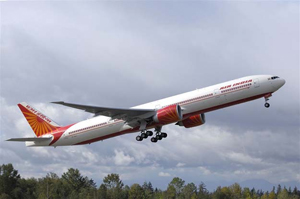 New Delhi, Oct 11: Air travelers should not expect any relief from sky-high domestic airfares this festive season which are up by over 30% since August despite airlines increasing domestic flights in coming winter. Airlines will operate about 11,900 weekly domestic flights — 3% more than the summer schedule but still way less than the figure of 13,500 seen two years back when Kingfisher Airlines (KFA) was still flying. The drastic drop in domestic capacity from KFA days will mean that fares remain high despite the hike in flights from this summer to winter.
New Delhi, Oct 11: Air travelers should not expect any relief from sky-high domestic airfares this festive season which are up by over 30% since August despite airlines increasing domestic flights in coming winter. Airlines will operate about 11,900 weekly domestic flights — 3% more than the summer schedule but still way less than the figure of 13,500 seen two years back when Kingfisher Airlines (KFA) was still flying. The drastic drop in domestic capacity from KFA days will mean that fares remain high despite the hike in flights from this summer to winter.
The aviation ministry has approved the domestic winter schedule of 11,886 weekly flights, up from the summer figure of 11,541. Air India, Jet Airways and Alliance Air will operate less domestic flights than their summer schedule and other airlines have added some flights, said sources.
"One-way fares on all important metro routes like Delhi to Mumbai or Kolkata are about Rs 10,000 if the ticket is bought within seven days of travel date. Earlier fares would shoot up during the peak of peak travel seasons like Puja holidays or Diwali. Now they are consistently high and will remain so unless the capacity increases with the new Tata airlines or fuel prices drop or there is some miracle," said Anil Kalsi, of Delhi-based Ambey Travels. The fares are about 25% to 30% higher than the summer rates.
Travel industry insiders say that given the way loss-making domestic airline industry (with the exception of IndiGo) is cutting domestic flights and using their planes on the more profitable foreign routes, fares for flying within the country will remain high. The only relief, they say, will come when Tata Sons launch their budget airline with AirAsia and the full service carrier with Singapore Airlines.
On their part, airline officials say that the government must rationalize operating costs, without which offering low fares would only mean ending up like Kingfisher. Mounting losses and capacity drop since Kingfisher shut down has led to a drastic hike in fares. Indian airlines have collectively lost Rs 53,650 crore from 2007 to 2013 and their total debt-cum-dues on March 31, 2013, were a staggering 1.07 lakh crore, according to the Centre for Asia Pacific Aviation.
The winter of 2011 (when trouble in Kingfisher had just started) saw 13,541 weekly domestic flights. This was possibly the highest ever capacity witnessed in the domestic market. Then Kingfisher started truncating its flight schedule. The summer of 2012 saw about 13,000 weekly flights with Kingfisher accounting for 2,500 of them. This number kept falling till the airline shut down on September 30, 2012. As a result, last winter saw just 10,935 weekly domestic flights.
"Domestic air travel is showing a declining trend while international travel to and from India has been rising constantly by 11%. We will see airline use more capacity on foreign routes. The domestic capacity will now rise — and possibly fares will fall — only when the two new Tata airlines are launched," said a senior official.
Weekly domestic flights
Winter 2011: 13,541 (trouble starts in Kingfisher)
Summer 2012: Slightly over 13,000 (Kingfisher has over 2,500 flights but keeps reducing them before shutting down on Sept 30)
Winter 2012: 10,935
Summer 2013: 11,541
Winter 2013: 11,886
Impact on fares: Lower capacity, higher losses and operating costs send fares zooming by over 30% this winter over summer





Comments
Add new comment